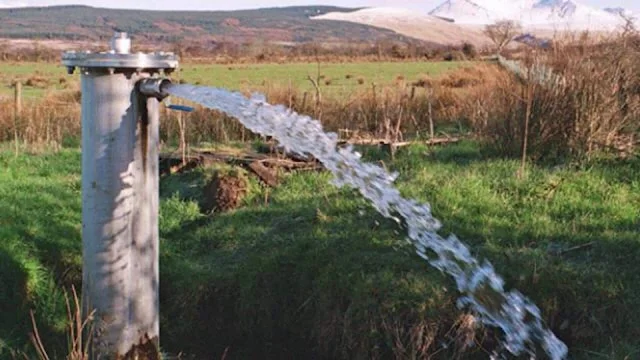Data indicating a reduction in India's groundwater levels by 450 cubic kilometres is alarming. This decline over the past two decades could lead to severe water shortages for agriculture and livelihood in the future. A study conducted by the Vikram Sarabhai Chair of Civil Engineering and Earth Sciences at the Indian Institute of Technology-Gandhinagar states that this reduction in groundwater is 37 times -- the total water storage capacity of the Indira Sagar Dam, India's largest reservoir.
One major reason for the decline is an 8.5% reduction in monsoon rainfall between 1951 and 2021. Additionally, the increase in winter temperatures by 0.3 degrees Celsius in North India has exacerbated the situation, as confirmed by researchers from the National Geophysical Research Institute (NGRI) in Hyderabad.
Reduced rainfall during the monsoon and increased temperatures during winter will undoubtedly increase the demand for irrigation water in the coming years. This increased demand, coupled with reduced groundwater recharge, will place additional pressure on the already water-stressed regions of North India. The Hyderabad-based NGRI study warns that due to the impacts of climate change, monsoon rainfall will decrease, and higher winter temperatures will reduce groundwater recharge by 6 to 12 per cent. Another aspect of the crisis is the decreased soil moisture in recent years, which implies that irrigation water demand will rise.
This situation is undoubtedly concerning for the security of our agriculture and food supply chain. Researchers have found that due to the reduced percentage of monsoon rainfall and relatively warmer winters, crop damage occurs, necessitating more groundwater for irrigation. Warmer winter temperatures lead to drier soil in fields, which can only be mitigated by longer periods of light rain. Policymakers need to seriously consider how to maintain groundwater levels. Along with initiating rainwater harvesting projects on a war footing in rural and urban areas, there is a need to rotate water-intensive crops.
In light of this crisis, there is a need to reconsider the politics of providing free electricity and water to farmers. The easy and cheap availability of groundwater encourages its overuse. Agricultural scientists need to focus on research for crops that can yield higher production in high temperatures and with less water, despite the effects of global warming. The government must not forget its primary responsibility to provide food for 1.4 billion people. A reduction in food production over time leads to increased inflation, which can lead to public discontent.
Policymakers need to seriously consider how to make agriculture economically viable, especially when facing economic crises. If this groundwater crisis deepens in the future, it will lead to increased public discontent. We must develop our practices and policies according to changing climate conditions. Additionally, water usage discipline must be enforced across the country.
Groundwater levels in the country are continuously declining. If groundwater levels continue to drop, it could lead to a major problem in the future, as water is essential for life. The depletion of groundwater imposes limits on biodiversity, which we must recognize. Developing alternative methods for groundwater extraction requires more resource investment, which increases costs. Due to the reduction in groundwater, large water sources like lakes, rivers, and seas are becoming shallow, impacting food supply extensively.
India frequently experiences droughts during summer. Even during the monsoon, rainfall distribution is uneven. In the future, the availability of water will become more critical. Climate change is causing this situation, as it alters weather and water patterns globally, leading to shortages and droughts in some regions and floods in others. Deforestation affects rainfall in forested areas. Poor water management, decreasing water sources, and lack of investment are major reasons for groundwater depletion.
The primary reason for declining groundwater is that traditional water sources in our country are diminishing due to low rainfall and irresponsible extraction, leading to lower groundwater levels. The number of borewells is steadily increasing.
Annually, 230 billion litres of water are used for irrigation in India's farmlands, with 90 per cent of the available groundwater being used for agriculture and the remaining 10 percent for domestic and industrial purposes combined. In reality, reduced rainfall and increased winter temperatures raise irrigation water demand, thus reducing groundwater recharge.
Today, the heavy reliance on groundwater for purposes such as irrigation, drinking water and industrial development is a serious problem. However, collecting rainwater on the surface is a highly effective and traditional technique for increasing groundwater levels. Water conservation can be achieved using small ponds, underground tanks, bunds, etc.
To prevent the decline in groundwater levels, the Water Authority should conduct large-scale awareness campaigns and educate people about water conservation methods. Ignoring this could lead to a third world war over water. We must remember that 97 per cent of earth's water is saline, with only three percent being freshwater. Of this, more than two-thirds exist as glaciers and polar ice caps. Water is a limited and precious resource, essential for all living beings, and must be managed properly to ensure adequate availability for our needs and to protect our environment.
To truly secure the future of India's population, the country must reform its policies and adopt a water-centric approach. As responsible citizens, whether in industry or other sectors, efficient water use can save us from the impending groundwater crisis. This is a serious issue requiring active participation from both the government and society to overcome this challenge.
---
*Social worker and activist working for the rights of tribal and marginalized communities



Comments